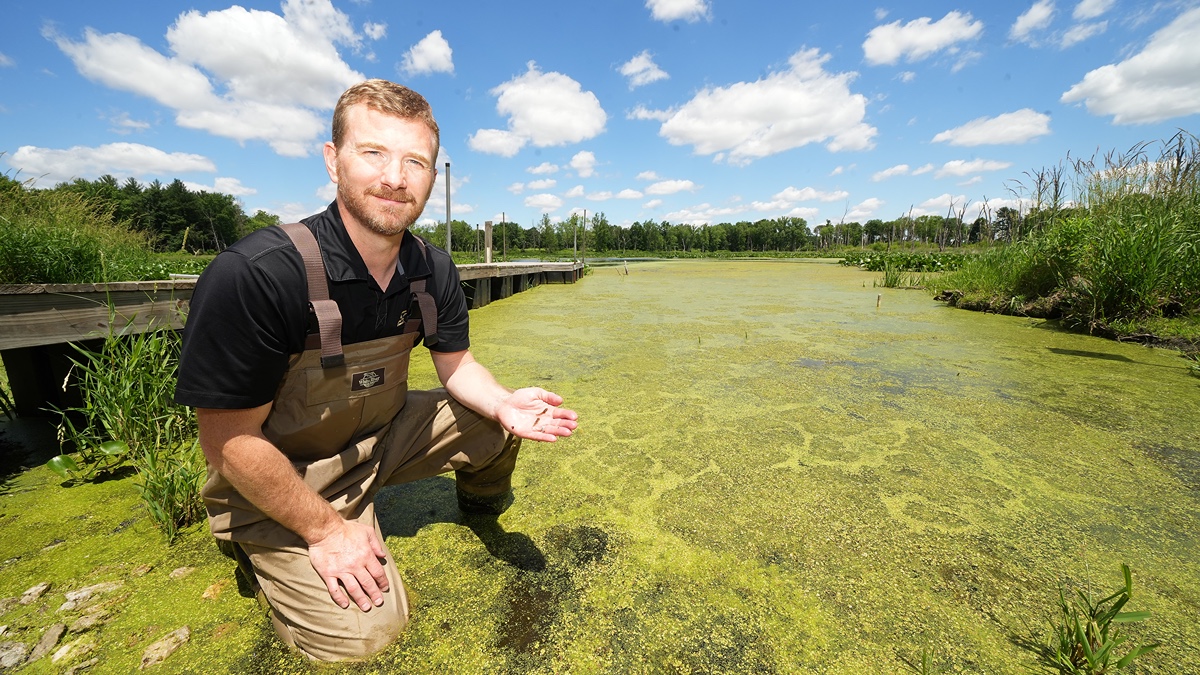FNR’s Hoverman receives Ag Research Award
The assistant professor candidate wanted ponds, lab facilities and open spaces. The Purdue Wildlife Area could fill that order — and it’s only 15 minutes from campus.
“That was a huge selling point,” recalled Jason Hoverman, now a professor in the Department of Forestry and Natural Resources and the 2024 recipient of the Agriculture Research Award, the College of Agriculture’s highest honor given to midcareer faculty members. “Not a lot of places have this setup.”
Hoverman accepted FNR’s offer in 2012. The next year he received the George Mercer Award (for published research excellence) from the Ecological Society of America. Then came Purdue’s Bravo Award (for innovation or creativity), university faculty scholar recognition, a pair of Seeds for Success Acorn Awards (for obtaining external sponsored awards in excess of $1 million), more than $9 million in funding from local, state and federal agencies and a stint as editor for an international journal, Oecologia.
While earning degrees at the University of Pittsburgh, he was hired as an undergraduate researcher for a professor focusing on how amphibians respond to predators. When tadpoles smell trouble, “they’ll change their morphology, such as their tailfin shape, to deal with that predator. Really cool stuff,” Hoverman said.“That opened my eyes — I can become a researcher for my career.”
The professor of vertebrate ecology’s research group addresses questions in the fields of aquatic ecology, community ecology, disease ecology and conservation. It studies ecotoxicology, too, which led to working with the Department of Defense in 2016 on assessing how PFAS — forever chemicals — affect amphibian populations. In 2020, DoD funding was obtained to examine the relative toxicity of fluorine-free foam alternatives, which are critically important in fire-suppression operations for the military.
“We still have the need for firefighting foams,” Hoverman said. “We’ve been testing alternatives to see if they are truly more ecologically friendly. That’s great to see: Before we widely adopt a new alternative, we know what impact it’s going to potentially have on species that will be exposed. That’s rewarding — to be on the front lines, generating information for folks who need it.”
Jessica Gurevitch, distinguished professor and dean’s research fellow in FNR, said Hoverman’s recent work “continues to contribute to the development of ecological risk assessments for emerging contaminants in Indiana, the United States more broadly, and has developed a global reputation for outstanding scholarly work. … His sustained research contributions to the agricultural sciences, research program leadership and dedication to training of the next generation of scientists have increased the research reputation of the College of Agriculture and Purdue.”
Purdue has invested nearly two decades on boosting the prospects of hellbenders, an imperiled amphibian species. This year Hoverman joined that effort.
“There’s more interest than we can accommodate,” he said, especially among graduate students applying for research positions. “Hellbenders are a huge draw. It’s inspiring, right? The fact that you have such broad interest in preserving the environment, understanding what impact we’re having as humans, coming up with solutions, moving forward — it’s really encouraging.”
About 300 salamanders, more or less 3 years old and 9 inches long, were released this summer.
“What is abundantly clear,” said professor Trenton Garner of the Institute of Zoology, Zoological Society of London, “is that Jason’s choice of research topics is not driven exclusively by scientific curiosity. He achieves academic excellence working on subjects that are of the highest conservation importance.”
Infectious disease, agricultural pollution and climate change threaten amphibians.
This is not the norm, as tackling even one of these topics is a research programme in itself. … Jason is one of the few who is generating the information that facilitates the triage process that allows the limited resources available to amphibian conservation to be applied judiciously.
- Trenton Garner, professor at the Institute of Zoology, Zoological Society of London







